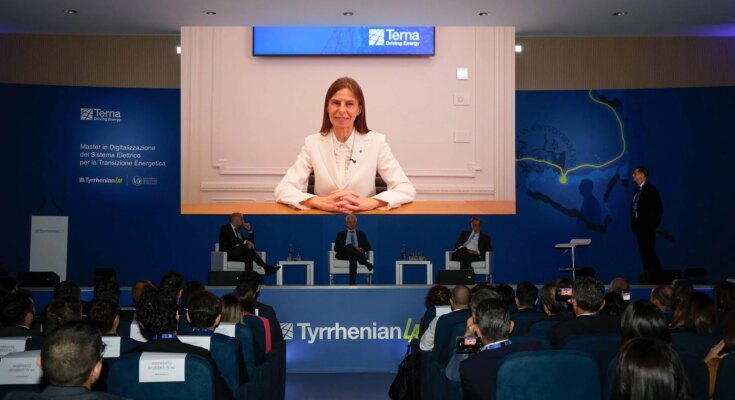Today marks the inauguration of the fourth edition of the Master’s degree “Digitization of electrical systems for the energy transition”, promoted by Terna in collaboration with the Universities of Cagliari, Palermo and Salerno, as part of the Tyrrhenian Lab project. The Master’s Degree, which has been extended for another two years, started at the three universities involved: in Palermo Terna President, Igor De Biasio, Terna Director of Strategy, Digital and Sustainability, Francesco Salerni and University Rector, Prof. Massimo Midiri; in Salerno Director of Development Strategy and Delivery of Terna Networks, as well as President and Scientific Coordinator of the Tyrrhenian Lab, Francesco Del Pizzo, and Rector of the University, Prof. Virgilio D’Antonio; in Cagliari Terna Director of Human Resources, Daniele Amati, Terna Director of Engineering and Project Implementation, Maria Rosaria Guarniere and Vice Chancellor of the University, Prof. Gianni Fenu. (VIDEO)
“The Tyrrhenian Laboratory is not just a training project: it is a real investment in the future of our country. With the fourth edition of the Master, we renew our commitment to train a new generation of highly qualified professionals, capable of managing the energy and digital transformation of the Italian electricity system”, said Giuseppina Di Foggia, CEO and General Manager of Terna. “Hundreds of applications for access to the Master confirm the great interest in this initiative. We want to offer young graduates not only the opportunity for professional growth, but also the possibility of actively contributing to the development of their home region. We are convinced that the energy transition is a challenge that can be won together, with competence and commitment. The Tyrrhenian Lab is a demonstration of how Terna intends to be the protagonist of this change”, concluded the CEO of Terna.
The Tyrrhenian Lab establishes itself, for the fourth year, as a training center of excellence that guarantees the development of advanced skills related to digitalization and the energy transition. The project is closely connected to the Tyrrhenian Link, an underwater electricity connection some 970 kilometers long that will unite Campania, Sicily and Sardinia. This work will enable increased energy transportation capacity, thereby contributing to improving the safety, adequacy and flexibility of the national electricity transmission network.
The Tyrrhenian Lab Master’s Degree, divided into 11 modules and final project work with a total of 60 training credits, has attracted persistent and increasing student interest, also the result of the talent attraction & acquisition campaign launched by the national electricity grid administrator, to identify and engage qualified young people interested in participating in the Master’s Degree: the training project has actually grown from 170 applications in the first edition to around 400 in the current edition.
Among those registered for the tender, 57 were selected to access the path that, once completed, will lead to the recruitment of Terna in the three regions involved, thus preventing the abandonment of the Southern region for professional reasons.
The high number of applications also allows us to outline the profile of young candidates who are mostly under 30 years old and come from STEM study programs, in particular from energy and nuclear, electrical, mechanical and management engineering. There was also a significant increase in the number of female candidates, +27% compared to the previous edition.



